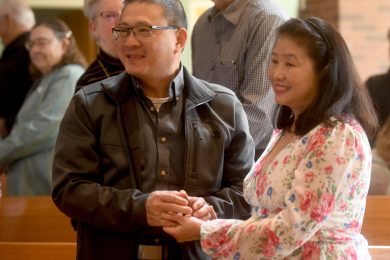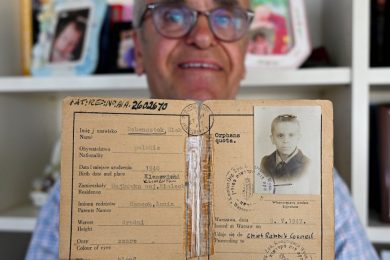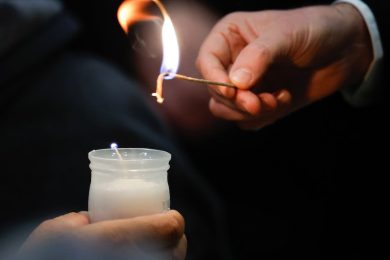He is compassionate. Fair yet firm. And willing to show mercy and forgiveness while also helping people see the error of their ways. This Christ-centered philosophy has served Judge Frank Kundrat well in his life and as a judge in the Seventh Judicial District Court of Minnesota.
“A judge, in my mind, needs to be, first and foremost, compassionate,” he said. “When I’m on the bench, I don’t wear my faith on my sleeve. I’m not preaching to them. But I do try to look at the people in front of me with the eyes of Christ.”
Originally from Cleveland, Ohio, Kundrat attended Catholic school in his youth and later enrolled at Case Western Reserve University.
He pursued his law degree at Cleveland-Marshall Law. After graduating, he served as a city attorney in Shaker Heights, Ohio, before moving to Minnesota in 1983.
He and his wife, Laurie, moved to the St. Cloud area, where they raised three children. Kundrat joined a law firm, where he practiced municipal law, labor law and corporate law. Later, he opened his own practice.
In 2005, Kundrat, who attends St. Mary’s Cathedral, felt God was calling him to something more. He began to study for the permanent diaconate at St. John’s School of Theology and Seminary in Collegeville.
“I was looking for something. I knew I had some kind of a mission I had yet to fulfill,” he recalled.
And then another opportunity presented itself — the chance to apply for an open seat as a judge for the Seventh Judicial District, which currently includes the counties of Becker, Benton, Clay, Douglas, Mille Lacs, Morrison, Otter Tail, Stearns, Todd and Wadena.
“I was torn. I was really enjoying my studies at St. John’s School of Theology, but at the same time I felt this pull that maybe I was supposed to apply to be a judge. So I prayed on it. I decided to apply, got on the list, interviewed and was chosen to be a finalist,” he said.
In the days following, he knew a decision was imminent.
“I remember I came home from work one night, exhausted, and decided to lay down. I prayed, ‘God, whatever you decide, I will do.’ And just then, the governor called and offered me the position,” he recalled.

Kundrat took the bench in early 2007 and was elected and re-elected to two six-year terms respectively in 2008 and 2014. Although he took a step toward retirement in June 2020, the pandemic created a backlog of cases and senior judges, including Kundrat, were asked to help out.
“Which I was pleased to do because to stop cold turkey is hard. This way, I can still help people. I feel very engaged and energized to still be hearing cases,” he said.
He hears all kinds of cases but is strongly passionate about family and juvenile court. Kundrat, whose father was a World War II Purple Heart veteran and suffered from post-traumatic stress disorder, feels he can relate in some ways to family dysfunction after years of watching his father struggle with his mental health.
“You try to see it through those eyes,” he said. “When I see a father who is abusive to his children, I try to look at the underlying issues. We try to come up with a plan to address the issues and get him the help he needs. Sometimes the courtroom is the first time they can admit or even recognize the problem. One father broke down in court and admitted, probably for the first time, that he was abused as a child. So we got him some help and now he’s a new man. He’s a better father now. Those are the stories that keep me going.”
It doesn’t mean he doesn’t get angry sometimes.
“Some cases are tough to hear, and then I do have to set aside my personal bias. That’s when I really need the reminder to look at them with the eyes of Christ,” he said.
“Just as Jesus displayed compassion, as a judge, I have compassion for you, but also, like Jesus demanded, I also need you to work with me. Jesus forgave people and said sin no more. You have to make a commitment to work with me, to work with the system, to get counseling or treatment, to serve your sentence. I am committed to helping you, and I hope for the same commitment in return.”
And it’s not only about the rights of the person in front of him. He has to consider the rights of the victims as well as the effect his decisions have on society as a whole.
“Most judges are in it because they want to help people for the good of society. That’s why I like working so much with families and juveniles — so we can hopefully turn things around,” he said.
“One important distinction is that treating people with compassion does not mean letting them off the hook. When someone commits a crime, you want to understand the reasons behind it, but it doesn’t mean they are going to get off scot-free. You are going to apply a penalty that is fair to society and also to the situation. It is a balancing act.
“Rights have to be looked at not only individually, but as a society. My right to do something also includes not trampling on yours. That’s when collaboration comes in, as well as patience and listening. You have to find a way to exercise your rights while not infringing on others.”
Kundrat recalls one case where a husband and wife both had addiction issues and, because of that, had their children removed from their care. Years after hearing their case, he ran into the man, now a chef, who was serving a meal at a conference Kundrat was attending.
The man leaned over the buffet line and said “’Judge, you might not remember me but you sent me and my wife to treatment instead of jail and we’ve been sober ever since. We got our children back and we now have a good life.’ You can see in a story like that how it not only impacted him, but also his children and, eventually, the greater good,”
Kundrat said. “You feel like possibly you had a hand in changing their course. That’s the most rewarding thing.”
Not every story has a happy ending, but Kundrat believes that everyone deserves the dignity of being heard.
“Patience and listening are key. Sometimes my staff will ask me why I let people go on and on in court. I say it is because it is therapy for them, it gives them a chance to process. They feel heard. They deserve their day in court. Everyone does.”
While the three c’s of compassion, commitment and collaboration pertain well to his role as a judge, Kundrat says everyone can apply the principles in their daily lives.
“Whether it’s a workplace conflict or something at home or even on your softball team, whatever it is, it all comes down to the ‘Golden Rule’ — treat others how you would want to be treated yourself,” he said.
“The greatest threat to human rights today is our inability to listen to each other. As a judge you find out quickly that there’s at least two sides to every story, oftentimes more than that. We have forgotten how to listen to each other and come up with a resolution. We’ve just become polarized. Often, there is a lot that is right on both sides, and that’s where can we reach some commonality and get something done.”




















